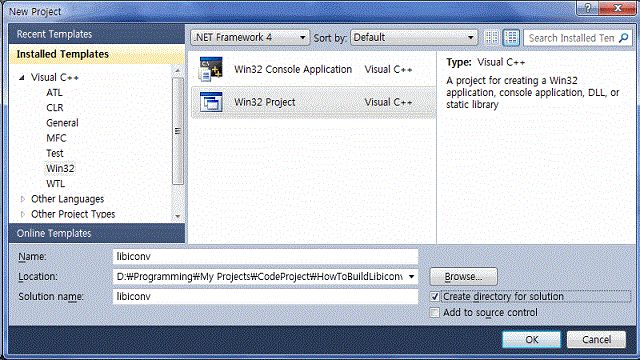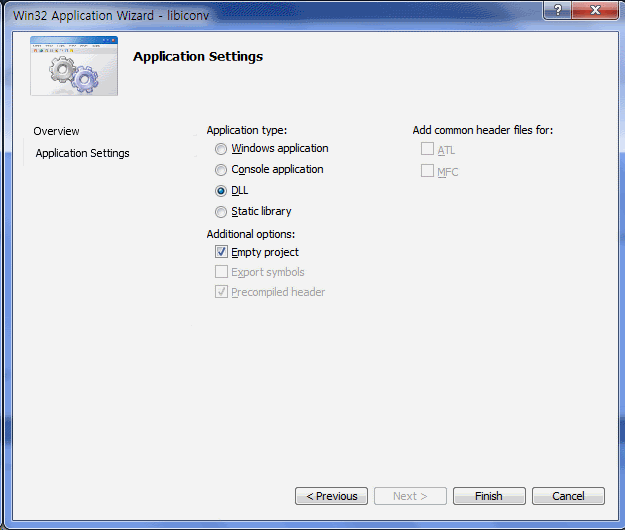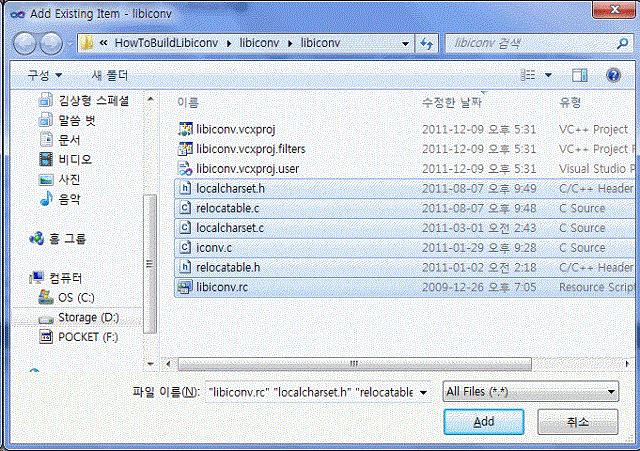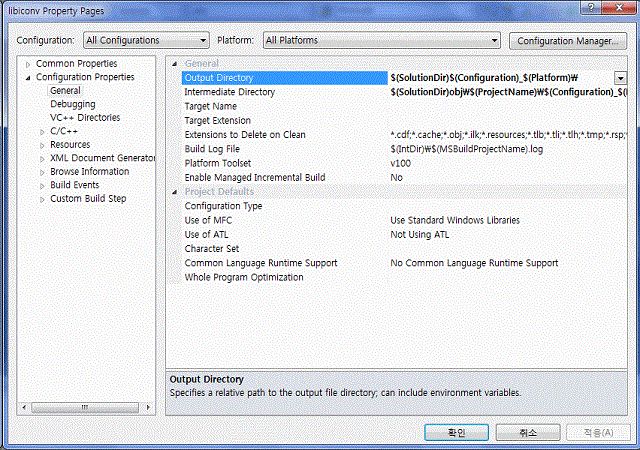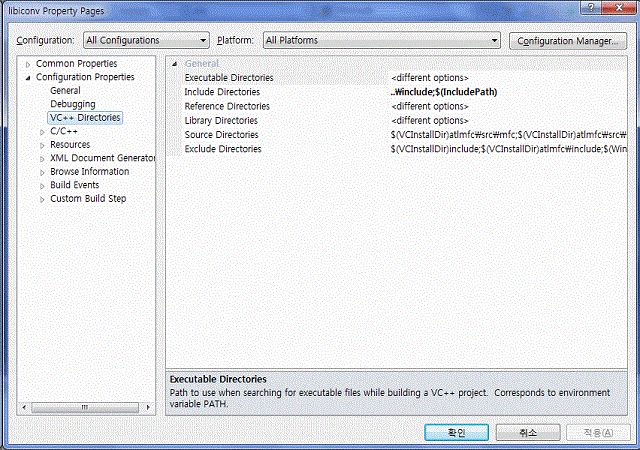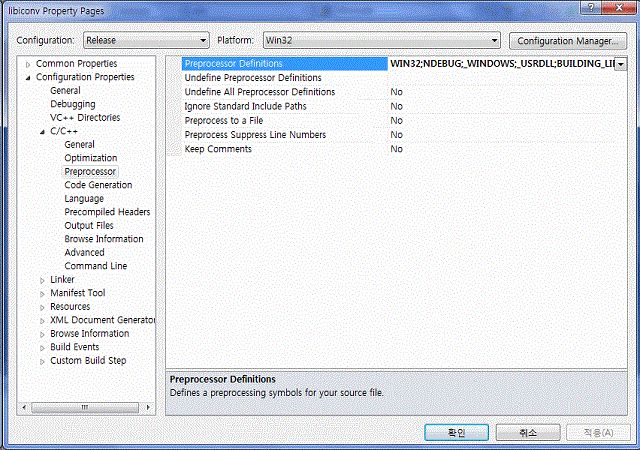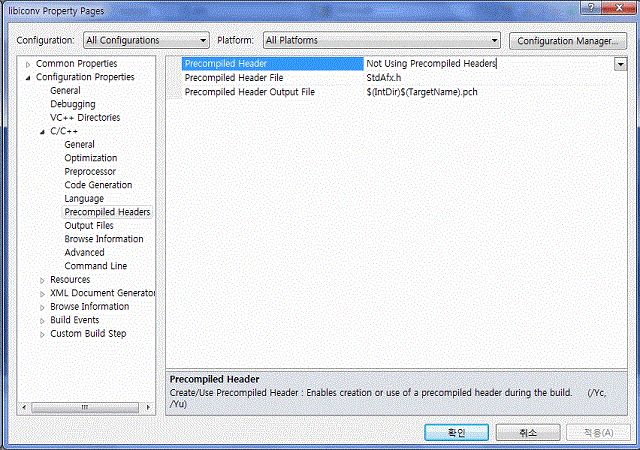libiconv Qt中的各种字符编码转化
首先声明一下:可以用一个跨平台的库,网址:http://www.gnu.org/software/libiconv/ Qt中正是引用了这个库
以下是我在WIN32下面编译成功的工程 : http://download.csdn.net/download/ljt350740378/9943280
下载了源码后,先是编译此库:https://www.codeproject.com/Articles/302012/How-to-Build-libiconv-with-Microsoft-Visual-Studio -- 这个是编译此库的说明文档
下面是说明:
How to Get the Source Code of libiconv
At the moment, the most recent version of libiconv is 1.14. You can download the source code of libiconv1.14 here and here. Of course, you can get the older versions of libiconv here.
How to Build
I am going to explain the case of Microsoft Visual Studio 2010 professional edition but the explanation can be applied to the earlier versions of Microsoft Visual Studio and to the express edition of each of them.
First Step
You download the most recent version of libiconv which is 1.14 from here or here. And unzip the downloaded file "libiconv-1.14.tar.gz" on your certain folder.
Second Step
You run your Microsoft Visual Studio. Then, you make a new WIN32 project. Let's say "libiconv" as the project name. Check to create directory for solution. Choose DLL as the application type and check Empty project for additional options. Click the button "finish" to generate the new project.
Third Step
Now, you have to copy some files from the folders generated by unzipping "libiconv-1.14.tar.gz" to the project folders. To build "libiconv", you need to compile three files "localcharset.c", "relocatable.c" and "iconv.c". That is the key idea!
Copy three files "relocatable.h", "relocatable.c" and "iconv.c" in the folder "...\libiconv-1.14\lib\" to the project folder "...\libiconv\libiconv\".
Copy "...\libiconv-1.14\libcharset\lib\localcharset.c" to the project folder "...\libiconv\libiconv\".
Copy "...\libiconv-1.14\libcharset\include\localcharset.h.build.in" to the project folder "...\libiconv\libiconv\" and then, rename the copied "localcharset.h.build.in" to "localcharset.h.
Copy "...\libiconv-1.14\windows\libiconv.rc" to the project folder "...\libiconv\libiconv\".
Make folder "include" under the project folder "...\libiconv\" so to make "...\libiconv\include".
Copy "...\libiconv-1.14\include\iconv.h.build.in" to the project include folder "...\libiconv\include" and then, rename the copied "iconv.h.build.in" to "iconv.h".
Copy "...\libiconv-1.14\config.h.in" to the project include folder "...\libiconv\include" and then, rename the copied "config.h.in" to "config.h".
And then, copy all the header files (*.h) and definition files (*.def) in the folder "...\libiconv-1.14\lib" to the project include folder "...\libiconv\include".
Fourth Step
Now, you have to add existing items to the project "libiconv" that we made at the second step. Execute "project > Add Existing items..." at the main menu to add existing items to the project.
Fifth Step
You can make 64-bit platform through configuration manager in order to generate libiconv.dll for 64-bit system. You can also make two other configurations "ReleaseStatic" and "DebugStatic" in order to generatelibiconvStatic.lib as a static link library.
At the project properties, change Output Directory as "$(SolutionDir)$(Configuration)_$(Platform)\" and Intermediate Directory as "$(SolutionDir)obj\$(ProjectName)\$(Configuration)_$(Platform)\".
Change Include Directories as "..\include;$(IncludePath)":
You have to add "BUILDING_LIBICONV" and "BUILDING_LIBCHARSET" to Peprocessor Definitions of all Platforms and of all configurations.
You'd better set Runtime Library to "Multi-threaded" when building dynamic link library libiconv.dll. Then, the dependency on VC Runtime library can be controlled by the applications that will be built and dynamically linked with libiconv.dll because libiconv.dll does not need VC Runtime library but only the application that useslibiconv.dll may or may not need VC Runtime library. However, when building the static link librarylibiconvStatic.lib, you can choose Runtime Library option for libiconvStatic.lib depending on the application that uses libiconvStatic.lib.
You have to change Precompiled Header option to "Not Using Precompiled Headers".
Sixth Step
Now, it is the time to tweak the source code of the libiconv.
libiconv.rc
Open libiconv.rc with text editor or the source code editor of Visual Studio IDE by double-clicking libiconv.rc in the Solution explorer and insert some code at line 4 as follows:
///////////////////////// 추가 / ADD / ДОВАВЛЯТЬ ////////////////////// #define PACKAGE_VERSION_MAJOR 1 #define PACKAGE_VERSION_MINOR 14 #define PACKAGE_VERSION_SUBMINOR 0 #define PACKAGE_VERSION_STRING "1.14" ////////////////////////////////////////////////////////////////////////////////
You may be asked to change Line endings to "Windows (CR LF)". Then, let it do so. It will be more convenient for you if you mainly use Windows.
localcharset.c
Open localcharset.c and delete or comment the lines 76 - 79 as follows:
///////////////////////// 삭제 / DELETE / удалить /////////////////////// ///* Get LIBDIR. */ //#ifndef LIBDIR //# include "configmake.h" //#endif ////////////////////////////////////////////////////////////////////////////////
iconv.c
Open iconv.c and delete or comment the lines 246 - 248 and add three lines there as follows:
///////////////////////// 삭제 / DELETE / УДАЛИТЬ /////////////////////// //size_t iconv (iconv_t icd, // ICONV_CONST char* * inbuf, size_t *inbytesleft, // char* * outbuf, size_t *outbytesleft) ///////////////////////// ?? / ADD / ????????? ////////////////////// size_t iconv (iconv_t icd, const char* * inbuf, size_t *inbytesleft, char* * outbuf, size_t *outbytesleft) ////////////////////////////////////////////////////////////////////////////////
localcharset.h
Open localcharset.h and delete or comment the lines 23 - 27 and add 7 lines there as follows:
///////////////////////// 삭제 / DELETE / УДАЛИТЬ /////////////////////// //#if @HAVE_VISIBILITY@ && BUILDING_LIBCHARSET //#define LIBCHARSET_DLL_EXPORTED __attribute__((__visibility__("default"))) //#else //#define LIBCHARSET_DLL_EXPORTED //#endif ///////////////////////// ?? / ADD / ????????? ////////////////////// #ifdef BUILDING_LIBCHARSET #define LIBCHARSET_DLL_EXPORTED __declspec(dllexport) #elif USING_STATIC_LIBICONV #define LIBCHARSET_DLL_EXPORTED #else #define LIBCHARSET_DLL_EXPORTED __declspec(dllimport) #endif ////////////////////////////////////////////////////////////////////////////////
config.h
Open config.h in the project include folder "...\libiconv\include" and delete or comment the lines 29 - 30 as follows:
///////////////////////// 삭제 / DELETE / УДАЛИТЬ /////////////////////// ///* Define as good substitute value for EILSEQ. */ //#undef EILSEQ ////////////////////////////////////////////////////////////////////////////////
Otherwise you can redefine EILSEQ as good substitute value.
iconv.h
Open iconv.h in the project include folder "...\libiconv\include" and delete or comment the line 175 and add 1 line as follows:
///////////////////////// 삭제 / DELETE / УДАЛИТЬ /////////////////////// //#if @HAVE_WCHAR_T@ ///////////////////////// 추가 / ADD / ДОВАВЛЯТЬ ////////////////////// #if HAVE_WCHAR_T ////////////////////////////////////////////////////////////////////////////////
Delete or comment the line 128 and add 1 line as follows:
///////////////////////// 삭제 / DELETE / УДАЛИТЬ /////////////////////// //#if @USE_MBSTATE_T@ ///////////////////////// 추가 / ADD / ДОВАВЛЯТЬ ////////////////////// #if USE_MBSTATE_T ////////////////////////////////////////////////////////////////////////////////
Delete or comment the lines 107-108 and add 2 lines as follows:
///////////////////////// 삭제 / DELETE / УДАЛИТЬ /////////////////////// //#if @USE_MBSTATE_T@ //#if @BROKEN_WCHAR_H@ ///////////////////////// 추가 / ADD / ДОВАВЛЯТЬ ////////////////////// #if USE_MBSTATE_T #if BROKEN_WCHAR_H ////////////////////////////////////////////////////////////////////////////////
Delete or comment the line 89 and add 2 lines as follows:
///////////////////////// 삭제 / DELETE / УДАЛИТЬ /////////////////////// //extern LIBICONV_DLL_EXPORTED size_t iconv (iconv_t cd, @ICONV_CONST@ char* * inbuf, //size_t *inbytesleft, char* * outbuf, size_t *outbytesleft); ///////////////////////// 추가 / ADD / ДОВАВЛЯТЬ ////////////////////// extern LIBICONV_DLL_EXPORTED size_t iconv (iconv_t cd, const char* * inbuf, size_t *inbytesleft, char* * outbuf, size_t *outbytesleft); ////////////////////////////////////////////////////////////////////////////////
Delete or comment the lines 26 - 31 and add 8 lines as follows:
///////////////////////// 삭제 / DELETE / УДАЛИТЬ /////////////////////// //#if @HAVE_VISIBILITY@ && BUILDING_LIBICONV //#define LIBICONV_DLL_EXPORTED __attribute__((__visibility__("default"))) //#else //#define LIBICONV_DLL_EXPORTED //#endif //extern LIBICONV_DLL_EXPORTED @DLL_VARIABLE@ int _libiconv_version; /* Likewise */ ///////////////////////// 추가 / ADD / ДОВАВЛЯТЬ ////////////////////// #if BUILDING_LIBICONV #define LIBICONV_DLL_EXPORTED __declspec(dllexport) #elif USING_STATIC_LIBICONV #define LIBICONV_DLL_EXPORTED #else #define LIBICONV_DLL_EXPORTED __declspec(dllimport) #endif extern LIBICONV_DLL_EXPORTED int _libiconv_version; /* Likewise */ ////////////////////////////////////////////////////////////////////////////////
How to Use
When you use newly built libiconv, the only header file that you need is iconv.h. You will need to link either the import library libiconv.lib or the static library libiconvStatic.lib in your project property or write the code in one of your source file as follows:
#pragma comment (lib, "libiconv.lib") or #pragma comment (lib, "libiconvStatic.lib")
In the source of the application that uses this library either libiconv.dll or libiconvStatic.lib, if you don't define anything but only include iconv.h, your application will use libiconv.dll while it will use libiconvStatic.lib if you define USING_STATIC_LIBICONV before you include iconv.h in your application as follows:
//#define USING_STATIC_LIBICONV #include <iconv.h>
Copyright Issues
The original libiconv is under LGPL licence. So, the tweaked libiconv has also to be under LGPL. If you develop any application that uses libiconv, you have to be careful about copyright issues. If your application is linked with libiconv.dll dynamically, you don't have to publicize your source code of your application. However, if your application is linked statically with libiconvStatic.lib, you have to publicize either the source code of the application or the object files (*.obj) of the application so that others can build the application that is linked statically with the library under LGPL license.
iconv.h
C:\Qt\Qt5.7.1\5.7\Src\qtwebengine\src\3rdparty\chromium\third_party\talloc\libreplace\system
感谢:http://blog.csdn.net/denny97104/article/details/45443055
QtConsole.pro中的代码:---WINDOWS下:
QT += core widgets
QT -= gui
CONFIG += c++11
TARGET = QtConsole
CONFIG += console
CONFIG -= app_bundle
TEMPLATE = app
SOURCES += main.cpp
# The following define makes your compiler emit warnings if you use
# any feature of Qt which as been marked deprecated (the exact warnings
# depend on your compiler). Please consult the documentation of the
# deprecated API in order to know how to port your code away from it.
DEFINES += QT_DEPRECATED_WARNINGS
# You can also make your code fail to compile if you use deprecated APIs.
# In order to do so, uncomment the following line.
# You can also select to disable deprecated APIs only up to a certain version of Qt.
#DEFINES += QT_DISABLE_DEPRECATED_BEFORE=0x060000 # disables all the APIs deprecated before Qt 6.0.0
LIBS += C:/Qt/Qt5.7.1/Tools/mingw530_32/i686-w64-mingw32/lib/libiconv.a
#LIBS += c:/MinGW/msys/1.0/local/lib/libzbar.a
#LIBS += c:/MinGW/lib/libiconv.a
// ConsoleApplication1.cpp : 定义控制台应用程序的入口点。
//
#include